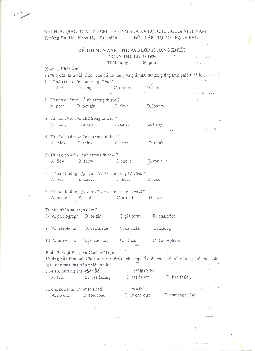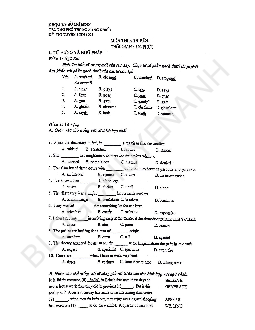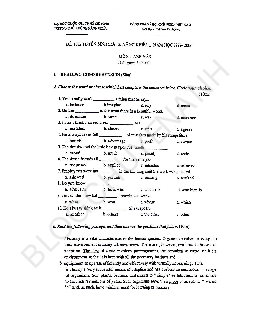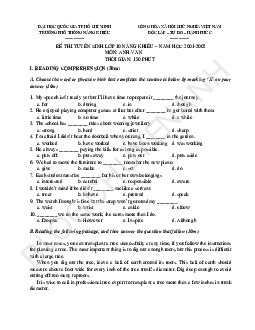




Preview text:
SỞ CAO BẰNG PHONETICS (1.25 PTS)
Mark the letter A, B, C or D on your answer sheet to indicate the word that fifer from the
rest in the pronunciation of the underlined part each of the following questions. (1,25 pts) Question 1. A. pens B. books C. chairs D. toys A. ə penz B.bʊks C. tʃerz D. tɔɪz Question 2. A. tidal B. gift C. bill D. public A. ˈtaɪdəl B.ɡɪft C. bɪl D. ˈpʌblɪk Question 3. A. worked B. watched C. stopped D. played A.wɝːkt B. wɑːtʃt C. stɑːpt D.pleɪd Question 4. A. humor B. bulb C. dump D. adult A.ˈhjuːmər B. bʌlb C. dʌmp D. əˈdʌlt Question 5. A. chair B. cheap C. chemist D. child A.tʃer B.tʃiːp C.ˈkemɪst D.tʃaɪld
GRAMMAR AND VOCABULARY (5.0 PTS)
Mark the letter A, B, C or D on your answer sheet to indicate the correct answer to each of
the following questions. (5.0 pts)
Question 6. She likes watching stars __________ night. A. in B. up C. at D. on ●
Giới từ “At” chỉ thời gian: Đây là giới từ được sử dụng phổ biến để chỉ một mốc thời
gian cụ thể. Vì vậy, nó thường chỉ: giờ chính xác, một dịp đặc biệt không chứa từ “day”;
hoặc dùng với các từ chứa “time” và “moment”
Question 7. If a disaster __________ in an area, people from the other areas will offer their help. A. happen B. happened C. is happening D. happens ●
Cấu trúc câu điều kiện loại 1: If + S + V (simple present), S + will/can/shall + V
Question 8. My mom __________ to her hometown recently. A.
didn’t return B. doesn’t returned C. hasn’t returned D. returned ●
Hành động xảy ra trong quá khứ và kéo dài liên tục đến hiện tại ( dấu hiệu “recently”) --> HTHT
Question 9. My mother __________ teaching in a small village 12 year ago. A. starts B. started C. has started D. is starting
Question 10. I wish you __________ something instead of sitting doing nothing. A. doing B. do C. would do D. will do ●
Câu ước: S + wish(es) + (that) + S + V-ed/were
Question 11. Lan got up late, __________ she couldn’t catch the first bus. A. as B. so C. when D. then As: bởi vì So: do đó When: khi Then: sau đó
Question 12. You __________ buy a ticket before boarding the bus. A. must B. must to C. has to D. might ●
Must: Phải làm gì đó (bắt buộc như quy định của luật pháp, mang tính khách quan) ●
Have to: Phải làm gì đó - mang tính chủ quan của người nói
Question 13. They cancelled the match __________ it rained heavily. A. because of B. because C. although D. in spite of ●
because of + noun = because + clause: bởi vì ●
In spite of + noun = although + clause: mặc dù
Question 14. The camera __________ Sarah bought yesterday was made in Japan. A. who B. which C. where D. whom ●
Đại từ quan hệ “ which” thay thế cho “ the camera”.
Question 15. Would you like __________ part in the charity program this summer? A. took B. taking C. to take D. take ●
Cấu trúc: Would you like N/ to V-inf : dùng để mời ai đó hoặc đưa ra lời đề nghị.
Question 16. He doesn’t mind __________ the housework. A. doing B. to do C. did D. done ●
Mind doing something: phiền làm gì
Question 17. The people __________ live next door to us are very friendly. A. which B. where C. who D. whom ●
Đại từ quan hệ “ who” thay thế cho “ the people”.
Question 18. __________ Christmas, children enjoy singing Christmas Carols. A. On B. At C. Since D. For ●
At là giới từ được sử dụng thường xuyên nhất khi nhắc tới một mốc thời gian cụ thể.
Thông thường nó sẽ chỉ một giờ chính xác, một dịp đặc biệt mà không chứa từ “day”,
hoặc đi cùng với các từ như “time”, “moment”, “present”,…
Question 19. If she finishes work early, she __________ home. A. will go B. would go C. could go D. went ●
Cấu trúc câu điều kiện loại 1: if + S + V (simple present), S + will/can/shall + V
Question 20. Let’s __________ somewhere for a drink. A. to go B. go C. went D. going ●
Cấu trúc: Let’s + V: đề nghị làm gì
Question 21. The word “cyclone” is another name for a __________. A. thunderstorm B. typhoon C. big wind D. tornado ●
Cyclone /ˈsaɪkləʊn/ = typhoon /taɪˈfuːn/ (n): lốc, gió xoáy ●
thunderstorm /ˈθʌndəstɔːm/(n):Bão có sấm sét và thường mưa to ●
Tornado /tɔːˈneɪdəʊ/(n): Bão táp, cơn lốc xoáy
Question 22. Scientists wanted people about the __________ volcano in five days ago. A. eruption B. journey C. measure D. heigh ●
volcanic eruption /vɑːlˈkæn.ɪk ɪˈrʌpʃən/: Phun trào núi lửa
Question 23. The majority of families in Viet Nam are extended families as many
__________ co-live to take care of each other. A. members B. people C. generations D. teams ● Member(n): thành viên ● People (n): người ●
Generation/ ˌdʒenəˈreɪʃəns/ (n): thế hệ ● Team (n): đội
Question 24. In the 18th century. Workers liked wearing jeans cloth because it was strong and did not __________ easily. A. wear out B. wear on C. wear off D. wear down ● wear out ( phr verb):
hao hụt, mài mòn, sờn bạc ● wear on ( phr verb): trôi qua chậm rãi ●
wear off ( phr verb): dần dần biến mất hoặc dừng lại ●
wear down ( phr verb): làm ai yếu đi, bào mòn cái gì
Question 25. Indian people find it difficult to get used __________ with the chopsticks. A. to eat B. to be eaten C. eat D. to eating ●
Cấu trúc: get used to Ving: dần quen với điều gì READING (2.5 PTS)
Read the following passage and decided which option A, B, C, or D best fits each space. (1.25 pts)
New Year is one of the most important (26) __________ in the United States. On New Year's
Eve, most people go to the parties. At twelve o'clock at night, everyone (27) __________
"Happy New Year" and they wish their friends and relatives good luck. New Year’s Eve is
usually a long night to many people. They don't go home until morning. Another holiday,
Halloween, is mainly (28) __________ children. On this holiday, children dress as witches,
ghosts or other characters. Most children go from house to house asking for candy or fruit.
(29) __________ the people at the house do not give them candy, the children will play a
trick on them. but this hardly ever happens. (30) __________ people give them candy or fruit.
Question 26. A. celebrations B. contests C. meeting D. seasons Question 27. A. tells B. says C. talks D. speaks Question 28. A. in B. at C. on D. for
Question 29. A. Although B. Whether C. If D. Even though Question 30. A. Little B. Much C. Many D. None 26. ●
Celebration/ˌseləˈbreɪʃən/ =festival (n): lễ hội, lễ kỉ niệm ●
Contest /ˈkɒntest/(n): (thể dục,thể thao) cuộc thi; trận đấu, trận giao tranh ●
Meeting (n): Cuộc gặp gỡ, cuộc hội họp, hội nghị ●
Season/´si:zən/ (n): mùa (trong năm) 27. ●
Say: Mang nghĩa nói ra hoặc nói rằng, chú trọng nội dung được nói ra. Chúng ta dùng
động từ “Say” để nhấn mạnh những gì chúng ta muốn nói. Đó chính là nội dung được nói
ra.Sau động từ này chúng ta không được sử dụng giới từ đi kèm với nó. Thường từ được
sử dụng kèm động từ “Say” là “That”. ●
Talk Mang nghĩa là nói chuyện với ai (Talk To Somebody), trao đổi với ai về chuyện gì
nhưng khác “Speak” ở chỗ nó nhấn mạnh đến động tác nói hơn.Sau động từ này chúng ta
thường sử dụng giới từ đi kèm với nó. ●
Speak Khi chúng ta dùng nó là khi chúng ta nhấn mạnh đến việc phát ra tiếng, phát ra
lời. Nó mang nghĩa nói chuyện với ai (Speak To Somebody), phát biểu, nói ra lời. Thông
thường theo sau nó không có tân ngữ, nếu có thì đó là danh từ chỉ ngôn ngữ. Và sau động
từ này chúng ta thường sử dụng giới từ đi kèm với nó. ● ●
Sử dụng câu điều kiện loại 1 ●
Although=even though: mặc dù ● Whether: liệu ● If: nếu 30. ●
Many + N đếm được số nhiều ●
Much + N không đếm được ●
little + danh từ không đếm được: có một chút, không đủ đề làm gì
Read the passage below the ick out ONE best option A, B, C or D to complete each of the
following sentences. (1,25 pts).
The weather is not beautiful all of the time. Perhaps you can remember a day when bad
weather made you afraid. One kind of bad weather that scares many people is called a
thunderstorm. This is what happens when there is a thunderstorm. First, you see a sudden
flash of bright light. A few seconds later you hear a loud rumbling sound. This quick flash is
called lightning and the loud sound is called thunder. Lightning is colorful, but it can cause
serious problems. Lightning is electricity that is moving very rapidly. It may be moving
between a cloud and the ground, between two clouds, or between two parts of the same
cloud. The lightning heats the air around it. This hot air expands, or get bigger, and it causes
the air to move in waves. The air waves pass you in a series, one after another. For this
reason, you may hear many rumbles and not just one sound.
Question 31. The weather __________. A. is always beautiful B. gets more beautiful C. is very nice very day D. is not always fine
Key: The weather is not beautiful all of the time.
Question 32. A thunderstorm is one kind of bad weather that __________. A. doesn’t scare anybody B. make many people scared C. nobody is scares of D. has no sound at all
Key: One kind of bad weather that scares many people is called a thunderstorm.
Question 33. A __________ is called lighting. A. loud rumbling sound C. slow flash C. thunderstorm
D. sudden flash of bright light
Key: A few seconds later you hear a loud rumbling sound. This quick flash is called lightning
and the loud sound is called thunder.
Question 34. Which statement is NOT TRUE?
A. The lighting always comes after the thunder.
B. A thunderstorm is one kind of bad weather.
C. people are afraid of thunderstorm.
D. Lighting is electricity that is moving very rapidly.
Key: First, you see a sudden flash of bright light.A few seconds later you hear a loud
rumbling sound. This quick flash is called lightning and the loud sound is called thunder
Question 35. On the whole, the passage is about __________. A. The nice weather B. The lightning C. The thunderstorm D. The loud sound ●
Lightning /'laitniɳ/(n):Chớp, tia chớp ●
Thunderstorm /'θʌndəstɔ:m/ (n):Bão có sấm sét và thường mưa to D. WRITNG (1.25 PTS)
Finish the second sentences so that it has a similar meaning to the first one, beginning
with the given words. (1,25 pts)
Question 36. Various kind of books are kept on the shelves.
→ They keep............................................................................................................................
Key: they keep various kind of books on the shelves. ●
Cấu trúc câu bị động: S + be( chia) + V3/ed + by 0 ( S:đối tượng bị tác động bởi hành động)
Question 37. The dress is very beautiful. She is wearing that dress.
→The dress.............................................................................................................................
Key: the dress which she is wearing is very beautiful. ●
Mệnh đề quan hệ : Đại từ quan hệ “which” thay thế cho “ the dress”
Question 38. I don’t have enough money, so I can’t buy that dictionary.
→ If I .........................................................................................................................................
Key: if i had enough money, I could buy that dictionary. ●
Câu điều kiện loại 2 được sử dụng để diễn tả những tình huống không có thật, không thể
xảy ra trong tương lai và giả định kết quả nếu nó có thể xảy ra. ● If + S + V-ed, S + would + V
Question 39. The last time she went out with him was 2 weeks ago.
→ She.......................................................................................................................................
Key: she hasn’t gone out with him for 2 weeks. ●
Hành động xảy ra trong quá khứ và kéo dài liên tục đến hiện tại ( dấu hiệu “recently”) --> HTHT
Question 40. They asked “What will you do to help your mother?”
→They asked him...................................................................................................................
Key: they asked him what he would do to help his mother ●
Cấu trúc câu tường thuật dạng câu hỏi: S+ask(ed) O+ từ đặt câu hỏi ( wh-question) + mệnh đề ( lùi thì)




